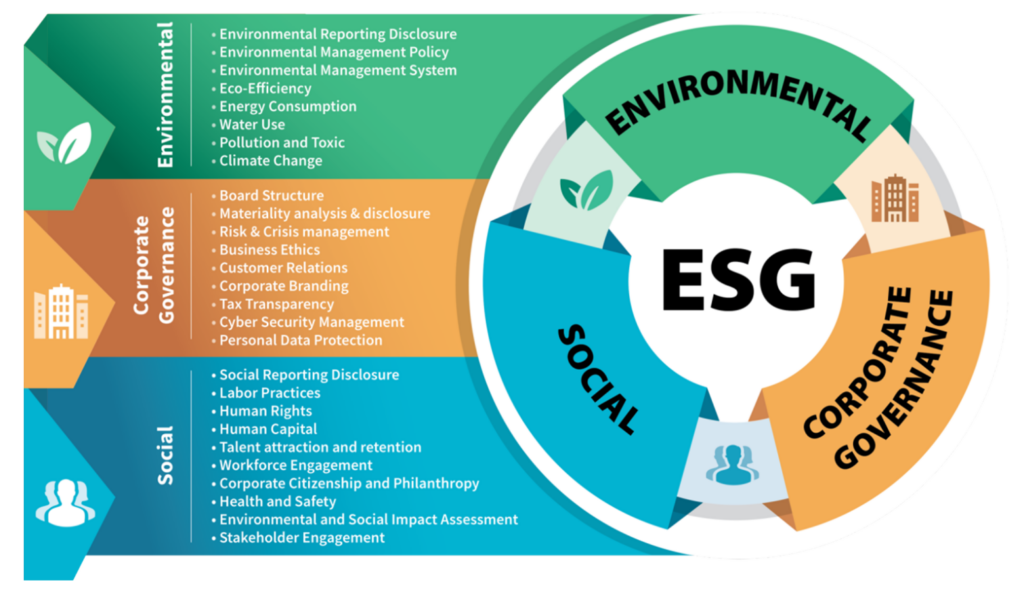Contents
Environmental, Social and Governance (ESG)
ESG in Singapore’s legal landscape involves integrating sustainability factors into business practices. Business are encouraged to adopt environmentally friendly, socially responsible, and ethically sound practices.
Legal professionals play a crucial role in advising and ensuring compliance with ESG standards, contributing to a sustainable and responsible business environment.

The Singapore Green Plan 2030
Singapore Green Plan 2030 intersects with Environmental, Social, and Governance (ESG) considerations and the legal sector in several ways, outlining the path forward and objectives for a nationwide initiative toward sustainable development. The plan includes significant targets, such as achieving net-zero emissions by 2050, to help mitigate climate change in Singapore and globally.
In line with this target, an increase in compliance, transactional, and advisory work is anticipated. Professional services, including legal practitioners, will play a crucial role in facilitating the world’s transition to net zero. Lawyers, as trusted advisors to businesses, are poised to make significant contributions in key areas such as:
- ESG reporting and disclosure
- Green and transition financing
- Carbon management
- Combating greenwashing
Sustainability Apex Programme (SAP)

In a move to address the climate crisis, Enterprise Singapore, The Law Society of Singapore, and the Institute of Singapore Chartered Accountants have launched the Sustainability Apex Programme (SAP) in 2024. This three-year initiative aims to equip lawyers and accountants with the capabilities needed to offer sustainability-focused professional services and create a knowledge-sharing community. The collaboration will include various activities designed to foster expertise and innovation in sustainability practices, including:

Further to support our members in navigating the Singapore Green Plan 2030, The Law Society will:
- Education and Training:
• Provide courses, certification programmes, workshops, masterclasses, and webinars on topics like environmental laws, ESG regulations, sustainability advisory and reporting, green finance and more. - Networking and Collaboration:
• Develop partnerships with environmental and sustainability organisations, financial institutions, and government agencies.
• Host panel discussions and roundtables for shared learning.
Seize the opportunity to broaden your knowledge in sustainability and expand your networks through the SAP. Members eager to learn more about this exciting opportunity are invited to fill in this form.
ESG Working Group
To address the increasing focus on ESG concerns, the Law Society has initiated a pioneering step by establishing the ESG Working Group. This group will play a pivotal role in evaluating the impact of ESG matters in the legal profession, ensuring that professionals are equipped to meet the emerging requirements of ESG practice. Importantly, the ESG Working Group will serve as a valuable resource panel for the Sustainability Apex Programme (SAP).
Other ESG Developments and Resources
Report on Sustainability-Ready Singapore Lawyers
The ‘Report on Sustainability-ready Singapore Lawyers’, commissioned by the Singapore Economic Development Board, Enterprise Singapore, and the Ministry of Law, and independently conducted by PwC Singapore, offers a comprehensive analysis of the growing market for sustainability-focused legal services.
Access the full report to explore potential opportunities for lawyers engage with sustainability initiatives.
Green Financing Industry Taskforce
An initiative convened by MAS, to accelerate the development of green finance through four key initiatives: (a) develop a taxonomy; (b) enhance environmental risk management practices of financial institutions; (c) improve disclosure; and (d) foster green finance solution. GFIT developed the Singapore Asia taxonomy for Singapore-based financial institutions, to create a system of classification or standards for green and transition activities, increase transparency between financial market participants, and reduce the risk of greenwashing. GFIT has issued four taxonomy consultation papers setting out its recommendations, they can be accessed here, here, here and here.
Transition Finance
MAS launched the Finance for Net Zero (FiNZ) Action Plan on 20 April 2023, which sets out MAS’ strategies to mobilise financing to catalyse Asia’s net zero transition and decarbonisation activities in Singapore and the region.
Code of Governance for Charities and IPCs
The Charity Council was revised to encourage charities to conduct their activities with ESG factors in mind and communicate their ESG activities to their stakeholders, with effect from 1 January 2024.
Sustainability Reporting Advisory Committee
The Committee was established to advise on a sustainability reporting roadmap for Singapore-incorporated companies. As part of its work, the Committee will provide inputs on the suitability of international sustainability reporting standards for implementation in Singapore.
MAS and SGX ESGenome Disclosure Portal
The portal was launched for companies to report ESG data in a structured and efficient manner, and for investors to access such data in a consistent and comparable format.
SGX Sustainability Reporting
By 2025, climate reporting will be mandatory for issuers in the (a) financial industry; (b) agriculture, food and forest products industry; (c) energy industry; (d) materials and buildings industry; and (e) transportation industry. Singapore Exchange Regulation (SGX RegCo)

